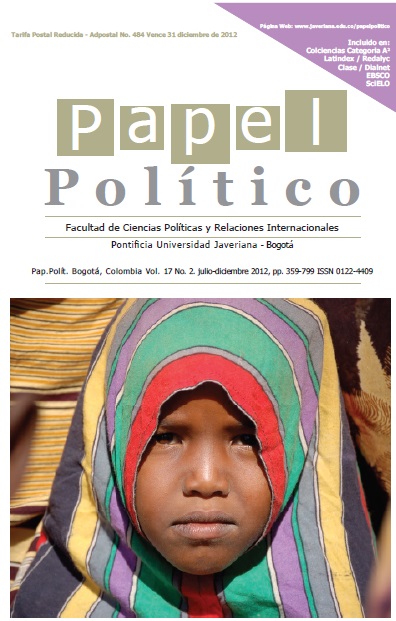Abstract
The rise of Colombian’s relative power capacities and the perception of a national government in search of activating the country’s participation in the international scene, allows to confirm what many analysts have called as a spin in the Colombian foreign policy. The pursuit of privileging dialog over ideological confrontation, to brake with the traditional position of bandwagoning with the United States, the separation of the foreign policy from internal affairs, specially in the subject of war against the guerrillas, the recomposition of relations with neighboring countries and the country’s return to the Latin American region, are some of the elements that confirm such spin. The foreign policy of Colombia towards the European Union has not been indifferent to this new viewpoint, although some continuities can be perceived, the truth is that the country is aiming for the mutual interest elements to be the ones that lead to a strengthening between the parts. That is how, taking into account the critical moment that the European bloc is going through in economical and financial terms and the country’s good mining environment, Colombia mainly focuses, in the commercial bond and investment impetus.This journal is registered under a Creative Commons Attribution 4.0 International Public License. Thus, this work may be reproduced, distributed, and publicly shared in digital format, as long as the names of the authors and Pontificia Universidad Javeriana are acknowledged. Others are allowed to quote, adapt, transform, auto-archive, republish, and create based on this material, for any purpose (even commercial ones), provided the authorship is duly acknowledged, a link to the original work is provided, and it is specified if changes have been made. Pontificia Universidad Javeriana does not hold the rights of published works and the authors are solely responsible for the contents of their works; they keep the moral, intellectual, privacy, and publicity rights.
Approving the intervention of the work (review, copy-editing, translation, layout) and the following outreach, are granted through an use license and not through an assignment of rights. This means the journal and Pontificia Universidad Javeriana cannot be held responsible for any ethical malpractice by the authors. As a consequence of the protection granted by the use license, the journal is not required to publish recantations or modify information already published, unless the errata stems from the editorial management process. Publishing contents in this journal does not generate royalties for contributors.


